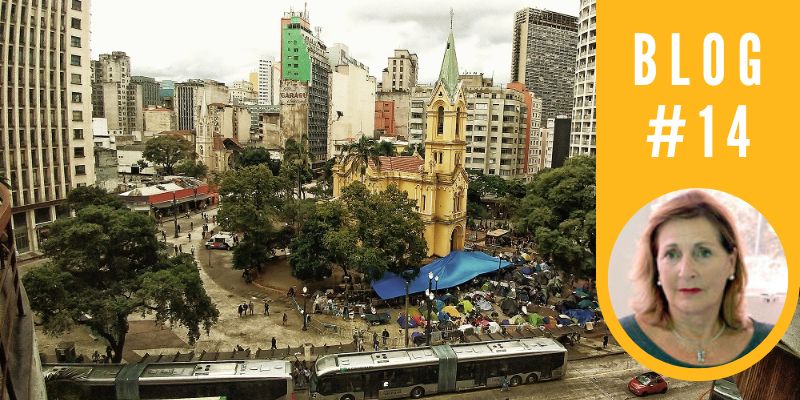Coordinated policy responses to health, biodiversity and climate emergencies - Emergencies, wellbeing and social justice in the Anthropocene
Helena Ribeiro shares with us her thoughts on coordinated policy responses to health, biodiversity and climate emergencies in the fourteens blog in this series based on the IGDC/YESI Webinar event ‘Emergencies, wellbeing and social justice in the Anthropocene’

In this Blog series we will hear from the panellists that took part in our webinar entitled ‘Emergencies, wellbeing and social justice in the Anthropocene’ which was made up of three sessions discussing: 1) Epistemological perspectives 2) Empirical experiences 3) Future scenarios. This blog accompanies the YouTube videos available in English and Portuguese.
Helena joined us in this webinar to discuss coordinated policy responses to health, biodiversity and climate emergencies.
Conflicts are destructing the planet
It is clear that coordinated responses to the various issues the world faces must be interconnected in order to be more effective, but since this universe is very broad, I will focus on two specific examples here.
Contact us
Interdisciplinary Global Development Centre
igdc@york.ac.uk
01904 323716
Department of Politics and International Relations, University of York, Heslington, York, YO10 5DD, UK
Twitter
I'm going to talk about an emergency that I think is not widely visible, namely war and armed conflict which are presently more widespread than ever before. According to the Johns Hopkins School of Public Health, two billion people currently live in armed conflict zones and conflicts are the most destructive activities on the planet, generating immense amounts of pollution and consuming natural resources in stratospheric proportions.
Just as an illustration, in the eastern region of Ukraine, explosions of gas and oil pipelines have released clouds of carcinogenic material into the air; attacks on sewage treatment plants mean that sewage waste is being released directly into bodies of water. Forest fires have been started by bombs, and fertile soils are being contaminated by heavy metals and radioactive substances leaked from missiles and military equipment. The country is also home to 35% of Europe's biodiversity and its forests and parks are landlocked in the conflict zone, including the Black Sea biosphere reserve.
In addition to these incalculable environmental impacts, wars cause death, injuries, collective unrest, and poverty; they are largely responsible for the huge number of refugees. In 2022 the world recorded the largest number of refugees at any time in history.
It seems to me that the Global Environmental Health communities, health diplomacy, international relations, and sciences in general have been fighting for the rights to health systems for refugees and for the protection of women and children, which are obviously fundamentally important, but actions have seemingly been lacking from a diplomacy that in theory negotiates and fights for peace and for establishing peace agreements.
Peace agreements are crucial in the resolution of all forms of crisis
In my view, the struggle for peace agreements in the various regions of the planet would be the first coordinated response to the interconnected health, climate and biodiversity crises.
Deforestation drives crisis
The second example I wanted to talk about, which is also a major driver of crises, is deforestation and the destruction of natural ecosystems. Behind the drive for this destruction is the exacerbated consumption of natural resources, low levels of recycling, and a food model very much focused on meat production. This results in activities connected to deforestation such as mining, extraction of native wood from wild species, and forest burning.
Obviously, we need to separate criminal activities from legalised activities. In respect to both, there is a lot of talk today about the use of modern and sophisticated technologies that allow advances in real time monitoring, such as drones and satellites. But they need to be linked to strong field work and the participation of the local population. In the case of criminal activities, these are a task that falls to military forces. But in the case of non-criminal activities, agreements and negotiations are critical.
Agreements and negotiations are critical
Internal and external diplomacy has a relevant role. However, isolated actions are not enough, it is necessary to involve the production system, NGOs, governments in different spheres, universities, local communities, and the cultural community.
Two points are relevant here. First, it is necessary to negotiate for the acceptance that deforestation is no longer necessary to increase production. Second, forest restoration is necessary all over the world, but especially in Latin America and Africa, which have hugely productive areas that were deforested and have potential for replanting trees or agricultural species, and generating rural employment.
The Great Green Wall in Africa is one example. Re-Green is also a recent project in Brazil (Como a re.green quer reflorestar 1 milhão de hectares_Reset.html por Natália Viri, 27 de abril de 2022. Resetpedia), which is the result of an agreement between the Agronomy School of University of São Paulo and companies in the financial market, which foresees the forest restoration of 1 million hectares of degraded land in 12 years, between the Atlantic forest in the south of Bahia and the Amazon forest in the south of Pará. 2 billion dollars of investment are available and its main aims are the planting of native species based on the tripod climate, community and biodiversity, with land acquisition and transformation of these lands into conservation units.
In urban areas, there is a landscaping movement in Brazil to plant gardens of tropical species or pocket forests, which have given a new dynamic to native nurseries.
These types of action demonstrate that resolution can come from an approach that takes place in public policies and multisectoral actions and, above all, in the negotiation between actors from different areas.
We can not talk only among ourselves. The dialogue needs to be open to the whole of society and should take into account the socio-environmental vulnerability of those groups most affected, because they are poorer, more vulnerable, discriminated against, and face a high level of deprivation, but also we must take account of the vulnerability of the environments themselves.
Checkout the full version of Helena’s talk and the other panellists in Session 3 via YouTube, as well as the other sessions:
Introduction ENGLISH
Session 1 Epistemological perspectives
Session 2 Empirical experiences
Session 3 Future scenarios
Final Summary Session
Introdução PORTUGUES
Seção 1 Perspectivas epistemológicas
Seção 2 Experiências empíricas
Seção 3 Cenários Futuros
Seção final - Síntese
| Featured Researcher | Helena Ribeiro |
|---|---|
|
|
Helena Ribeiro is Professor of Global Environmental Health and Sustainability in the Department of Environmental Health at the University of São Paulo. Helena completed her BSc in Geography at the Catholic University of São Paulo (Brazil) then went on to complete her MA in Geography at the University of California Berkeley (USA), and her PhD in Physical Geography with the University of São Paulo (Brazil). Helena carried out her post-doc with the International Academy of Environment, Geneva (Switzerland). |
Contact us
Interdisciplinary Global Development Centre
igdc@york.ac.uk
01904 323716
Department of Politics and International Relations, University of York, Heslington, York, YO10 5DD, UK
Twitter
